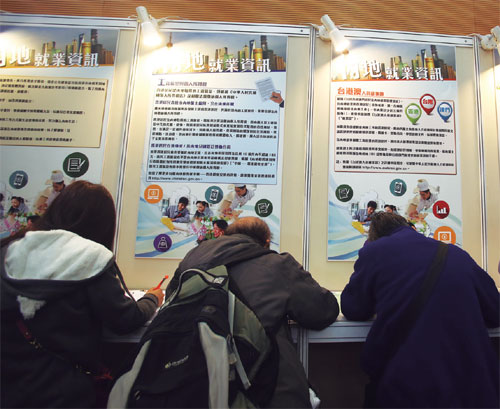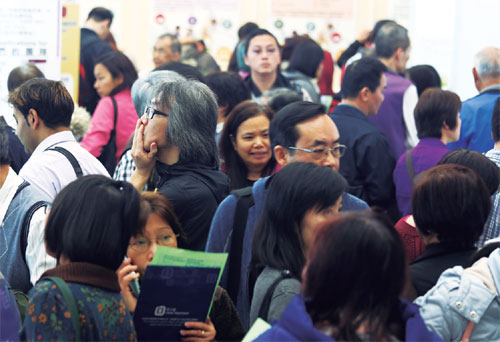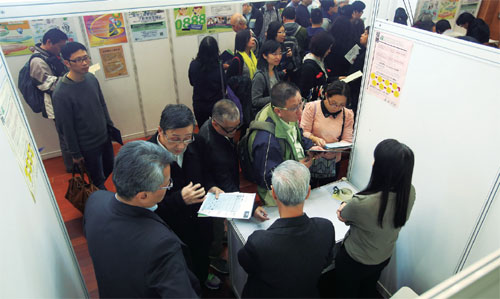Hong Kong's ageist attitudes are getting pretty old
Updated: 2016-03-23 09:05
By Sylvia Chang(HK Edition)
|
|||||||
Highly qualified seniors are being forced into menial jobs to escape financial ruin, it's the darker side of a culture that claims to respect older workers - even though it really doesn't. Sylvia Chang reports.
On a Wednesday morning in March, 68-year-old Chan Chung-yui and his friend, 59-year-old Wong Luk-kit, arrived at the Tung Chung office of the Home Affairs Department. It was 9:50. They were looking for work and for that they needed to prove they had secondary education.
Hong Kong not only has an aging society, it's also a society rife with institutional ageism. It's common for people here to be forced to retire somewhere between 55 and 60. For them, it means finding work at lower pay, at best, or applying for Comprehensive Social Security Allowance, a meager HK$3,200 a month, at worst.
It's odd, in a city where the labor force is predicted to peak in 2018 at around 3.6 million, before sliding into a steady, downward slope. Hong Kong will need those workers being turfed out today, not only to sustain the labor force, but to help support the city's narrow tax base.
People above retirement age, or approaching it, can relieve some of these pressures on the economy and society at large, by boosting human resources, feeding the taxation pool and keeping consumer spending buoyant. The elderly are significant human resources that need to be valued, said Alfred Chan Cheung-ming, chair professor of Social Gerontology in the Department of Sociology and Social Policy, Lingnan University.
Here's how the experts see it: in the next 15 years, the working population of Hong Kong (between 16 and 64 years) will fall by 15 percent. Chan estimates that as a loss of about 600,000 people.
"The government has realized the potential of the elderly in the labor force, but current policy does not support them," says Chan, who is also chairman of the government's Commission on the Elderly.
Chan Chung-yui waiting outside the Home Affairs Department, with high school diploma in hand, is a case in point. He was a chef on the mainland for 20 years. He is trained in nutrition and food safety; is skilled in preparing different cuisines. He had 50 staff working under him on the mainland. He came home in 2012 in high hopes of continuing his career. That's not what happened. "The employers in Hong Kong always think that I'm too old to manage their chefs," Chan said. Interview after interview led to rejection after rejection. He had to trade in his chef's hat for a security guard's uniform or not work at all.
Slim chance
He went to a job fair a few weeks ago hoping his luck would change. This, after all, was a government sponsored shindig, offering something like 4,000 jobs for the elderly and middle aged. Chan came away disappointed but having a clearer picture of his future.
Most jobs on offer at the fair were menial positions, needing only secondary education. They paid minimum wage, HK$32.5 an hour.
For as much as the city needs to keep productivity of seniors high, the job market is already stuffed with under employed college graduates, clamoring for jobs and yelling at the old folks to get out of the way. Even at the job fair, workers under 50 crowded around most of the booths. Youth are the future - so there's little debate about who gets preference.
"We filled in applications, gave them to employers, and that was it. We've never got any replies," said Chan's friend Wong.
"Most Hong Kong companies haven't realized that people above 65 are valuable in their own ways. Some with experience in management can work as senior executives after retirement, and some with specialized knowledge can be directors over newer employees," says Alfred Chan.
The preference for younger workers is deeply embedded. He cited the catering industry where Chan Chung-yui was shut out. Most restaurants demand their employees work almost 11 hours a day.
"It's hard for people over 40 to do that. If employers were willing to separate working hours into shifts, more middle-aged and elderly people would join," Alfred Chan says. He also points out the urgency for the government to work closely with business, saying each group should bear responsibility for covering such things as labor insurance, an area that specifically targets older workers for discrimination.
The insurance industry demands that employers pay twice the normal premium for employees over 50. It's an encumbrance that looms large in the rejection of older folks by prospective employers.
Hong Kong will have to start importing workers after 2018. "If Hong Kong wants to maintain its high value-added economy, it should make preparations now. One way is to re-train mature workers," says Alfred Chan.
Keep re-training
About all that's out there for redundant workers is security guard training. The majority of other industries require significant re-training programs but he urges that society provide these for the "young elderly" between 55 and 70, in its own interest.
Chan Chung-yui and Wong met each other at a security guard training class at a community center in Tung Chung. They were given basic training in property management, how to identify visitors, how to conduct a patrol and how to deal with a fire emergency.
Chan earned his Category A Security Personnel Permit in 2012. He was limited to hold security jobs in private residential buildings with a single main access. Most buildings that fit that description, already are being torn down for redevelopment. Chan couldn't find anything, so worked as a part-time cleaner and plate washer.
Early this month, Chan was upgraded to a Category B Security Personnel Permit. That allows him to be a security guard anywhere. The bad news is the permit expires next year, a day before he turns 70. His future as a top gun security guard is limited to about 400 days.
Wong's phone rang. The boss at the other end of the call wanted a closer look at both men but there seemed to be hesitation. Wong offered compliments and got an interview. Time and date were set.
"What if he rejects us anyway?" Wong muttered.
"Then we wait to die," Chan answered. After that neither one spoke.
Contact the writer at sylvia@chinadailyhk.com
|
The government sponsored a job fair in March to provide 2,000 jobs for the elderly and middle-aged. Photos by arker Zheng / China Daily |
|
Hong Kong's labor force is predicted to peak in 2018 at around 3.6 million. |
|
The preference for younger workers is deeply embedded in employers' mindset. |
(HK Edition 03/23/2016 page7)


